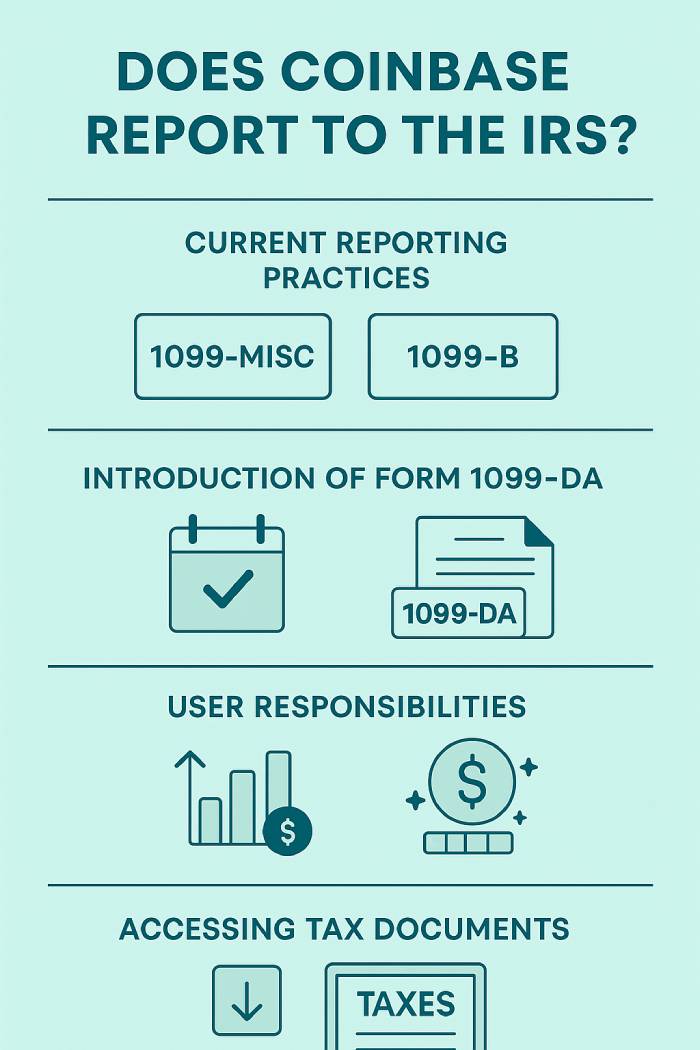Does Coinbase Provide Information to the IRS?

As one of the most widely used crypto exchanges in the U.S., Coinbase is required to report certain user data to the IRS. Over time, the reporting requirements for crypto transactions have grown more comprehensive, and starting in 2025, they will expand even further. Understanding what Coinbase reports to the IRS is crucial for anyone filing a crypto tax return.
Present Coinbase Tax Reporting Regulations
As of the 2025 tax year, Coinbase reports two primary types of crypto-related income:
- Form 1099-MISC: Sent to users who earn $600 or more in staking rewards, referral bonuses, or other promotional crypto income. This form is submitted to both the user and the IRS and alerts the agency that you have taxable crypto income to declare.
- Form 1099-B: Issued to users who participate in futures trading on Coinbase. This form details specific types of trading activities, but not standard spot trades.
While Coinbase reports certain transactions to the IRS, it does not currently submit capital gains or losses from crypto trades. Users are still required to calculate those gains using their own records and report them on their tax return.
Coinbase does not share raw transaction data with the IRS. However, it gives users access to a full Coinbase transaction history, which includes gain/loss summaries that are essential for accurate crypto tax filings.
Expert Insight: "Taxpayers should not assume that just because they didn’t receive a tax form, their activity is invisible to the IRS," says Sarah Young, a crypto tax specialist at CryptoTaxAdvisors. "The IRS uses algorithms to match blockchain transactions with user identities, especially for major platforms like Coinbase."
New Tax Forms Coming in 2025: Form 1099-DA
Beginning January 1, 2025, the IRS is rolling out stricter reporting requirements for crypto exchanges like Coinbase. This includes a new tax form:
- Form 1099-DA: Designed to capture the gross proceeds from digital asset sales and exchanges. Coinbase will be required to issue this form in early 2026 for 2025 activity.
- Cost Basis Disclosure: By 2026, Form 1099-DA will also include cost basis data, which will help users and the IRS calculate crypto capital gains more accurately.
These updates aim to close the gap in crypto tax compliance by making it harder to underreport digital asset activity.
Expert Insight: "Form 1099-DA will be a game changer," notes Alex Grant, CPA and blockchain compliance consultant. "It will allow both the IRS and taxpayers to clearly see the full scope of crypto trades and simplify capital gains calculations."
Understanding the Tax Implications of Coinbase Transactions: Essential Information
Whether or not you receive a 1099 form, you're still legally required to report your Coinbase transactions. Here’s what you must include:
- Income Over $600: If you earn over $600 in rewards or staking, Coinbase will issue a 1099-MISC.
- Crypto Conversions: Swapping one crypto for another (like BTC for ETH) must be reported—even if Coinbase doesn't submit this info directly.
- Capital Gains and Losses: Any profit or loss from trading must be calculated and included in your crypto tax return.
The IRS compares tax reports with Coinbase data and may send notices—like Letters 6173 or CP2000—if it detects unreported crypto income.

Real-World Experience: How Users File Taxes from Coinbase
Many Coinbase users rely on crypto tax tools or professionals to navigate tax season. Here are a few examples:
- Samantha, a part-time trader, uses CoinTracker to automatically sync her Coinbase account. "It saved me hours and helped me uncover staking rewards I had forgotten about," she says.
- James, a long-term HODLer, downloads his raw transaction history manually from Coinbase each year. He works with a tax professional to interpret capital gains and apply loss harvesting strategies.
- Nina, a crypto freelancer, earns in USDC through Coinbase Commerce. She tracks income monthly and reports it as self-employed income, using crypto tax software to handle conversions and historical prices.
These firsthand experiences show how important it is to stay organized and proactive. Most users recommend reviewing your Coinbase Taxes section at least quarterly—not just in April.
Reporting Your Crypto Taxes Accurately
Even if you don't receive a Coinbase tax form, you're still responsible for full reporting. Crypto taxes include more than just income:
- Capital gains from trades
- Income from staking or airdrops
- Losses from sold assets
Using crypto tax software can simplify the process. Many tools, including TokenTax and CoinTracker, allow you to import your Coinbase transaction history directly via API.
Expert Tip: "Crypto tax software bridges the gap between complex transaction records and IRS-compliant filings," says Jennifer Kwon, tax attorney and advisor for fintech startups. "It’s especially useful for users with multiple wallets or frequent trades on platforms like Coinbase."
Where to Find Your Coinbase Tax Report
Coinbase gives users access to detailed tax documentation:
- Log in to your Coinbase account.
- Go to the “Taxes” section.
- Download your gain/loss reports, raw transaction CSVs, and any available tax forms.
For users with many trades or complex activity, working with a tax professional is recommended.
Conclusion
Coinbase reports certain types of crypto activity to the IRS—primarily through Form 1099-MISC and, beginning in 2025, Form 1099-DA. Even if you don't receive a tax form, you're still required to report your crypto income, trades, and gains. Use your Coinbase transaction history and crypto tax software to ensure you report your taxes accurately and stay compliant in the ever-changing world of digital asset regulations.




